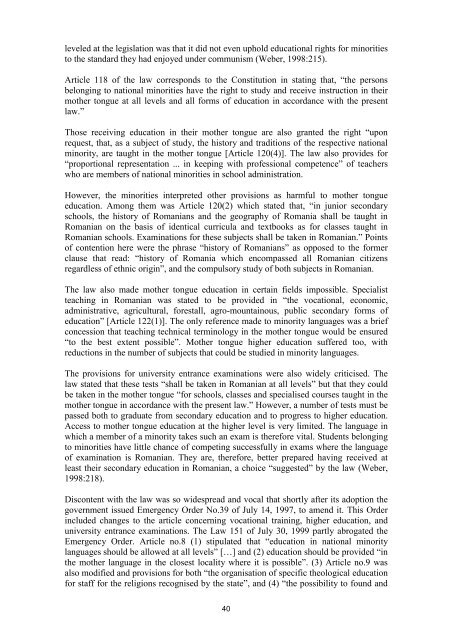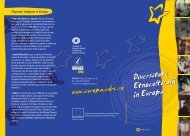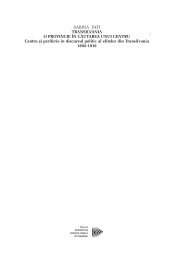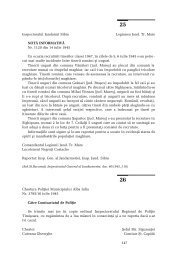Southeast Europe
Southeast Europe
Southeast Europe
You also want an ePaper? Increase the reach of your titles
YUMPU automatically turns print PDFs into web optimized ePapers that Google loves.
leveled at the legislation was that it did not even uphold educational rights for minorities<br />
to the standard they had enjoyed under communism (Weber, 1998:215).<br />
Article 118 of the law corresponds to the Constitution in stating that, “the persons<br />
belonging to national minorities have the right to study and receive instruction in their<br />
mother tongue at all levels and all forms of education in accordance with the present<br />
law.”<br />
Those receiving education in their mother tongue are also granted the right “upon<br />
request, that, as a subject of study, the history and traditions of the respective national<br />
minority, are taught in the mother tongue [Article 120(4)]. The law also provides for<br />
“proportional representation ... in keeping with professional competence” of teachers<br />
who are members of national minorities in school administration.<br />
However, the minorities interpreted other provisions as harmful to mother tongue<br />
education. Among them was Article 120(2) which stated that, “in junior secondary<br />
schools, the history of Romanians and the geography of Romania shall be taught in<br />
Romanian on the basis of identical curricula and textbooks as for classes taught in<br />
Romanian schools. Examinations for these subjects shall be taken in Romanian.” Points<br />
of contention here were the phrase “history of Romanians” as opposed to the former<br />
clause that read: “history of Romania which encompassed all Romanian citizens<br />
regardless of ethnic origin”, and the compulsory study of both subjects in Romanian.<br />
The law also made mother tongue education in certain fields impossible. Specialist<br />
teaching in Romanian was stated to be provided in “the vocational, economic,<br />
administrative, agricultural, forestall, agro-mountainous, public secondary forms of<br />
education” [Article 122(1)]. The only reference made to minority languages was a brief<br />
concession that teaching technical terminology in the mother tongue would be ensured<br />
“to the best extent possible”. Mother tongue higher education suffered too, with<br />
reductions in the number of subjects that could be studied in minority languages.<br />
The provisions for university entrance examinations were also widely criticised. The<br />
law stated that these tests “shall be taken in Romanian at all levels” but that they could<br />
be taken in the mother tongue “for schools, classes and specialised courses taught in the<br />
mother tongue in accordance with the present law.” However, a number of tests must be<br />
passed both to graduate from secondary education and to progress to higher education.<br />
Access to mother tongue education at the higher level is very limited. The language in<br />
which a member of a minority takes such an exam is therefore vital. Students belonging<br />
to minorities have little chance of competing successfully in exams where the language<br />
of examination is Romanian. They are, therefore, better prepared having received at<br />
least their secondary education in Romanian, a choice “suggested” by the law (Weber,<br />
1998:218).<br />
Discontent with the law was so widespread and vocal that shortly after its adoption the<br />
government issued Emergency Order No.39 of July 14, 1997, to amend it. This Order<br />
included changes to the article concerning vocational training, higher education, and<br />
university entrance examinations. The Law 151 of July 30, 1999 partly abrogated the<br />
Emergency Order. Article no.8 (1) stipulated that “education in national minority<br />
languages should be allowed at all levels” […] and (2) education should be provided “in<br />
the mother language in the closest locality where it is possible”. (3) Article no.9 was<br />
also modified and provisions for both “the organisation of specific theological education<br />
for staff for the religions recognised by the state”, and (4) “the possibility to found and<br />
40









